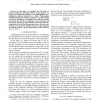Free Online Productivity Tools
i2Speak
i2Symbol
i2OCR
iTex2Img
iWeb2Print
iWeb2Shot
i2Type
iPdf2Split
iPdf2Merge
i2Bopomofo
i2Arabic
i2Style
i2Image
i2PDF
iLatex2Rtf
Sci2ools
100
Voted
CDC
2009
IEEE
2009
IEEE
Cell design in bacteria as a convex optimization problem
In this paper, we investigate the cell design of bacteria during the exponential growth. To this purpose, we propose to formulate the problem as a non differentiable convex optimization problem equivalent to a Linear Programming feasibility problem. Its resolution predicts for a specific medium not only the distribution of metabolic fluxes and the maximal growth rate, but also the concentrations of the ribosomes and the proteins involved in the metabolic network and thus the composition of the cell for different growth rates. Moreover, our model recovers the known modular structure of the regulation of metabolic pathways for the gram-positive model bacterium Bacillus subtilis.
Related Content
| Added | 16 Feb 2011 |
| Updated | 16 Feb 2011 |
| Type | Journal |
| Year | 2009 |
| Where | CDC |
| Authors | Anne Goelzer, Vincent Fromion, Gérard Scorletti |
Comments (0)

